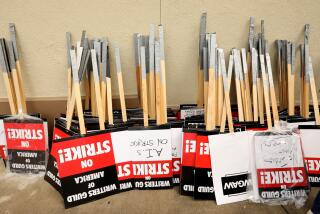Picketing Writers Provide Action and a Plot Twist
- Share via
The scene being acted out Tuesday at the Fox Television Center had almost everything a Hollywood writer could hope for: a script, plenty of actors and a surprise ending.
All that was missing was dialogue, something that worried some of the 800 picketing members of the Writers Guild of America who were taking their strike against the Alliance of Motion Picture and Television Producers into its fifth week.
There have been no talks between the writers and producers since March 10. No new negotiations have been scheduled over such issues as residual payments and creative control over scripts.
“The problem is there is no dialogue,” said Carl Kurlander, the co-writer of the “St. Elmo’s Fire” screenplay. “That’s the saddest thing. There’s got to be some dialogue between writers and producers.”
Confronted Union Negotiator
After they put down their picket signs, Kurlander and other strikers cornered union negotiator Brian Walton outside the Fox studio to vent their frustration.
The group stood a respectful distance from the studio gate so as not to block traffic, just as they had done during their hour and a half of picketing. Such gentility bothered some of the strikers too.
“What is the leverage? Where’s the fist?” asked screenwriter Robert Collector, who said he had just finished a script for what he described as a Chevy Chase movie. “What are we doing when we let every car pass? We’re not stopping anything.”
Others complained that the walkout, which started March 7, was begun too soon to hit producers where it hurts most--in next season’s television programming.
Walton disagreed. He said the strike’s quick start caught producers by surprise and kept them from stockpiling scripts for new-season production, which would normally start in June.
“There is pressure there,” Walton said. “I’m not going to (mislead) you. We’re not going to shut down the town. But it’s hitting things in syndication. They can’t get pilots written and pressure is building.”
The surprise confrontation was not what union leaders had expected. As Tuesday’s picketing had begun, they had predicted continued unity, no matter how long the walkout lasts.
Strike organizer Michael Hoey, a writer and director who has worked on the films “Fame” and “Bridges to Cross,” compared picket line planning to script writing.
“You can apply it as though it were a story conference,” he said. “We developed a scenario . . . and worked out the subplots. We had our own producer--you can liken me to that. As all writers do, we rewrote each other.”
As a result, guild leaders have “rejected any kind of rabble-rousing,” Hoey said. “We did not want to give the impression we were a violent group in any sense.”
Television and movie writer George Kirgo, who is the union’s West Coast president, said the strikers will not picket Monday’s Academy Awards “because that ceremony honors the entire industry.”
On Tuesday’s picket line, there were scattered comments about blocking traffic into the sprawling Fox studio and other forms of civil disobedience. But even though they carried strike signs depicting a lightning bolt coming out of a pen, the pickets dismissed any notion of that kind of action.
“I was joking when I said we should be burning cars and turning over trucks,” said striker Jack Lieberman. “This is not the normal strike line. Not all members drive Mercedeses. But nobody here seems to be hungry.”
Comedy writer Marty Nadler, who has written for such shows as “Happy Days,” “Chico and the Man” and “Laverne and Shirley,” said a long walkout will hurt many writers, who earn an average of $40,000 a year.
“It’s a real drama to the person who doesn’t have next week’s mortgage payment or rent,” he said. “It’s more of a situation comedy to the person who has been able to save some money.”
Del Reisman, an action show writer and a member of the guild’s negotiation team, said writers are ready and willing to resume negotiations.
‘Backup Positions’
“We have alternate plans and backup positions,” Reisman said, declining to elaborate.
At their Sherman Oaks headquarters, however, producers’ representatives said late Tuesday that their “final” offer made to writers at the start of the strike is just that. The alliance has asserted that its proposal would raise writers’ pay by $50 million over three years, even though it calls for a reduction in residual payments for some one-hour TV shows.
Alliance spokesman Herb Steinberg said Walton has met informally since March with J. Nicholas Counter III, chief negotiator for the producers. “Nothing has come out of those talks that would indicate that a (new) meeting would serve any purpose,” Steinberg said.
Steinberg said there has been “some interruption” in television production, with 22 segments of shows left unfilmed due to the strike. But “only one pilot out of maybe 35 or 40 was affected,” he said.
“The only happy ending the strike can have is if the writers get realistic and look at the industry as it is now, not what it was three years ago. The writers don’t seem to be coming to a realistic view,” Steinberg said.
More to Read
The biggest entertainment stories
Get our big stories about Hollywood, film, television, music, arts, culture and more right in your inbox as soon as they publish.
You may occasionally receive promotional content from the Los Angeles Times.











